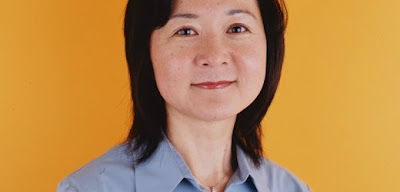
Revenge
Eleven Dark Tales
Yoko Ogawa
Stephen Snyder, Translator
(Picador)

The woman at the hotel tells the man she likes watching him swim in the pool, visits for the show (with her dog) every day. She clutches a package to her chest, claims it is 800 pages of a 1,000 page novel she is working on. When she disappears, she leaves the package behind, and he opens it to find it is but a sheaf of blank pages.A woman who sews is asked to make a bag for a night-club singer. To hold what? The singer's heart. She was born with it exposed, wears clothes to hide it from the world. The bag that is fabricated is beautiful. The seamstress decides on seal skin, "It's soft and strong, and it repels moisture while providing superior insulation --- just what a seal needs. And it's easy to care for."
A woman goes to a bakery to buy two strawberry shortcakes. She explains to another customer that one is for her son. "Today is his birthday."
Really? Well I hope it is a happy one. How old is he?"
"Six. He'll always be six. He's dead."
Ogawa is an odd one, and this volume is as strange as it gets. Children are dying, hearts are exposed, an old man runs "A Museum of Torture." Kiwis (and tomatoes) figure big. Every story is larded with details that lock the mysterious to the everyday. Reminds one of Kafka where there's a machine to tattoo one's sins on a still live body, a machine built and operated professionally. Or a town (crafted by Shirley Jackson) that regularly holds a stoning of one of the villagers who has been selected by chance drawing: the ritual is regular, orderly, apparently accepted by all.
In Revenge all becomes a rich, interconnected pastiche. The Museum features a pair of tweezers, which "were used to extract the hair from the victim's head, one strand at a time."
"I'm not sure I understand," I said.
"I suppose it does seem a bit strange," he said, nodding and touching his hair again. "The hairs are extracted one at a time, a procedure requiring infinite patience and perseverance. Until the scalp is complete exposed ... In reality, it does no physical harm, but we seem convinced that our very existence is somehow bound up in our hair."
The woman who listens to this grisly tale says she understands perfectly: "I'm a beautician. I should know."
And shortly after she leaves, she begins to think of doing just that to her boyfriend. "The next time my boyfriend comes over," she thinks, "I'll give him a haircut on the balcony. I'll cover him with a plastic cape and put a towel around his neck. And then I'll tie his arms and legs to the chair. Maybe this old man will lend me some straps. They've got plenty to spare."
All the horrors get nicely melded here, exactingly. In "The Man Who Sold Braces," the Museum-keeper turns up as uncle of a boy. He visits regularly, brings surprises for the child. He constructs a model airplane for him, but "the plane was oddly out of kilter, as thought none of the pieces were placed where they should be. The cockpit had gaps, the wheels were askew, and, worst of all, the wings had been attached at crooked angles." It fell completely apart after the old man took his departure.
§ § § Several years ago, we wrote on these pages an examination of Ogawa's The Diving Pool. The reviewer seemed perplexed, nonplussed by these stories that were elegantly composed, and ominous, artfully odd. "Because of her perfect pacing," he wrote, "even the oddest plot twists become believable." We feel the same pangs and doubts and admiration for Revenge. The stories that work, do so exquisitely. The very first "Afternoon at the Bakery" --- is almost perfect: structure, plot, mix of weird and commonplace. But some of the others can't take the overload, as it were --- falling under the sheer weight of weird detail. In many cases, they are saved by the exhilarating language. This from "Sewing for the Heart," on the art of the bag. "Now, you may be wondering why I get so excited. You may be thinking that a bag is just a thing in which you put other things. And you're right, of course. "
But that's what makes them so extraordinary. A bag has no intentions or desires of its own, it embraces every object that we ask it to hold. You trust the bag, and it, in return, trusts you. To me, a bag is patience; a bag is profound discretion.
--- Linda Weise